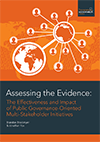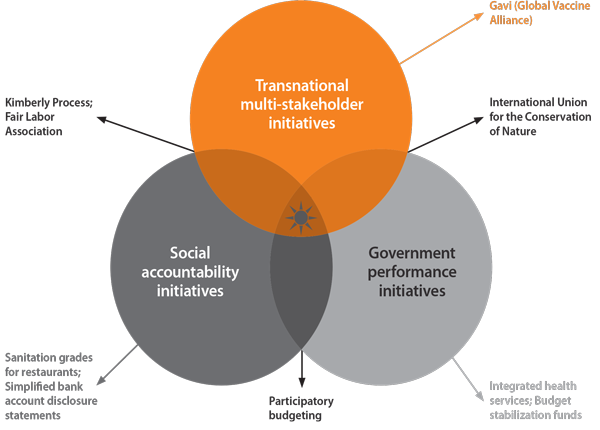
Assessing the Evidence: The Effectiveness and Impact of Public Governance-Oriented Multi-Stakeholder Initiatives
Date: September 2015
Authors: Brandon Brockmyer, Jonathan Fox
Publication type: Working Paper
Published by: Transparency and Accountability Initiative, ARC
Transnational multi-stakeholder initiatives (MSIs) – voluntary partnerships between governments, civil society, and the private sector – are an increasingly prevalent strategy for promoting government responsiveness and accountability to citizens. While most transnational MSIs involve using voluntary standards to encourage socially and environmentally responsible private sector behavior, a handful of these initiatives, such as the Extractive Industries Transparency Initiative (EITI), the Construction Sector Transparency Initiative (CoST), the Open Government Partnership (OGP), the Global Initiative on Fiscal Transparency (GIFT) and the Open Contracting Partnership (OCP) - focus on information disclosure and participation in the public sector.
Unlike private sector MSIs, which attempt to supplement weak government capacity to enforce basic social and environmental standards through partnerships between businesses and civil society, public sector MSIs ultimately seek to bolster public governance. But how exactly are these MSIs supposed to work? And how much has actually been achieved?
The purpose of this study is to identify and consolidate the current state of the evidence for public governance-oriented MSI effectiveness and impact. Researchers collected over 300 documents and interviewed more than two dozen MSI stakeholders about their experiences with five public governance oriented multi-stakeholder initiatives.
This paper provides a snapshot of the evidence related to these five MSIs, and suggests that the process of leveraging transparency and participation through these initiatives for broader accountability gains remains uncertain. The report highlights the ongoing process of defining MSI success and impact, and how these initiatives intersect with other accountability actors and processes in complex ways. The study closes with key recommendations for MSI stakeholders.
 Figure 1: Public governance MSIs function at the intersection of three types of activities: transnational multi-stakeholder initiatives, government performance initiatives, and social accountability initiatives.
Figure 1: Public governance MSIs function at the intersection of three types of activities: transnational multi-stakeholder initiatives, government performance initiatives, and social accountability initiatives.
Brandon Brockmyer At the time he co-authored this report, Brandon Brockmyer was an independent researcher and PhD candidate at the School of International Service at American University. He has over ten years’ experience working in non-profit and advocacy organizations, most recently as a research officer for the Pew Charitable Trusts, where he authored several reports on government fiscal and economic performance. He graduated Phi Beta Kappa from Reed College and received an MA from New York University. Brandon also studied peace and conflict resolution at Universidad Nur in Santa Cruz de la Sierra, Bolivia and volunteered with Columbia University’s International Trauma Studies Center to promote community resilience among Liberian refugees living on Staten Island. Prior to Pew, Brandon worked as a researcher for a variety of national and international nongovernmental organizations, including the Texas Municipal Police Association, Good Shepherd Services, and the Clinton Foundation. His dissertation research explored the efficacy of transnational multi-stakeholder transparency standards across different national contexts. He completed his PhD in 2016. Jonathan Fox Jonathan Fox is a professor in the School of International Service at American University. He studies the relationships between accountability, transparency and citizen participation. He is the director of the Accountability Research Center. His most recent publications include articles in World Development and the IDS Bulletin, and reports published by Making All Voices Count, U4: Anti-Corruption Resource Center and the Transparency and Accountability Initiative. His books include Accountability Politics: Power and Voice in Rural Mexico (Oxford 2007) and Mexico’s Right-to-Know Reforms: Civil Society Perspectives (co-editor, Fundar/Wilson Center 2007). He was a founding member of the International Expert Panel of the Independent Reporting Mechanism of the Open Government Partnership and currently serves on the boards of directors of Fundar (Mexico) and the Bank Information Center (DC). For online publications, see http://jonathan-fox.org/.
